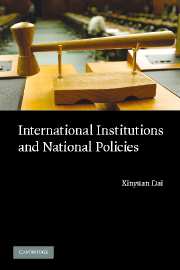Book contents
- Frontmatter
- Contents
- List of tables
- Acknowledgments
- 1 Introduction
- 2 The study of international institutions
- 3 Monitoring arrangements
- 4 Compliance mechanisms
- 5 The power of weak international institutions
- 6 Conclusion
- Appendix A Formal solutions
- Appendix B Ranking of signatory countries in LRTAP
- Bibliography
- Index
3 - Monitoring arrangements
Published online by Cambridge University Press: 22 September 2009
- Frontmatter
- Contents
- List of tables
- Acknowledgments
- 1 Introduction
- 2 The study of international institutions
- 3 Monitoring arrangements
- 4 Compliance mechanisms
- 5 The power of weak international institutions
- 6 Conclusion
- Appendix A Formal solutions
- Appendix B Ranking of signatory countries in LRTAP
- Bibliography
- Index
Summary
As chapter 2 has suggested, work on international institutions has been greatly shaped by the repeated PD game. In light of this model, international institutions resolve the collective action problem by providing compliance information and thereby facilitating compliance mechanisms such as reciprocity or reputation (Keohane 1984). Although information provision by international institutions lies at the foundation of neoliberal institutionalism, little effort has been made to specify exactly how international institutions provide information on compliance.
Empirically, except in a few large and strong regimes, treaty organizations rarely provide information completely by themselves. Rather, a host of nonstate actors often participate in monitoring states' compliance to a varying extent. Indeed, treaty regimes vary as to who detects noncompliance and who brings it to light. For example, in the NPT regime, the treaty organization carries out both routine and special inspections. In contrast, human rights treaty organizations rarely go beyond collecting governmental self-reports. While these examples show the diversity in how much or how little treaty organizations do, the following examples illustrate the diversity in how involved other actors are in different treaty regimes. The rules of the GATT, and subsequently the WTO, are only enforced as a result of formal complaints filed by states. In many environmental regimes, in contrast, NGOs often detect noncompliance and bring it to light.
- Type
- Chapter
- Information
- International Institutions and National Policies , pp. 33 - 68Publisher: Cambridge University PressPrint publication year: 2007



